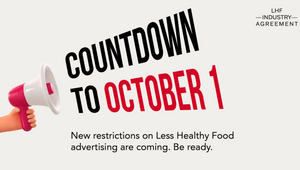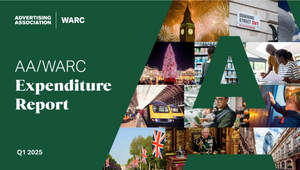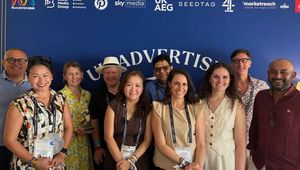
Creative Effectiveness: Why Clarity, Culture and Courage Matter More Than Ever

In today’s fragmented, fast-moving media world, creative effectiveness has become harder to define and yet more important than ever at the boardroom table. That was the focus of a roundtable hosted by UK Advertising at Cannes Lions, where leaders from gaming, retail, FMCG, luxury and UK creative companies explored what it takes to build brands that matter.
Despite some of the industry’s focus on quick wins, everyone agreed chasing short-term attention does not cut it. The work that truly works is the kind that builds trust, drives growth, and lands with people in a way that lasts. That means thinking beyond demographics to understand culture and designing ideas that move with it.
Ewa Moxham, brand director at Yoplait, gave a powerful example of how her team tailors creative across Europe. In the UK, they prioritise emotional storytelling that connects with parents. But in France, they lead with the product, showing it being eaten, which signals trust and taste in that market. The creative idea may be consistent, but the execution flexes to local expectations. It was a reminder that cultural fluency is not a luxury, it’s a necessity.
Laura Downey, head of brand and consumer marketing at Amazon UK, added that the most effective ideas often start from a single human insight. “If it starts with something true,” she said, “you have the permission to travel with it.” That clarity of intent anchored in emotion is what allows great ideas to scale.
Karine Elkobbi of Cuvee Carat Champagne offered a different lens in the luxury world, where the challenge isn’t just relevance but resonance. “You have to bridge the visible and the invisible,” In luxury, effectiveness comes from subtlety and depth, not from shouting louder.
Reframing Heritage
It was striking how often the group returned to the idea of brand heritage not as something to overcome, but as a creative asset. Nadia Kokni, whose background spans JD Sports and Hugo Boss, talked about the relaunch of the Adidas Superstar. Rather than moving away from its legacy, the campaign reframed it, linking past credibility with contemporary culture. The result? 15 million pairs sold in a year.
That success wasn’t about nostalgia, it was about relevance. “We didn’t dilute the story,” she said. “We sharpened it.” That sense of rediscovering what made a brand powerful in the first place came up repeatedly. In a world obsessed with reinvention, it felt like a timely reminder: effectiveness isn’t always about starting from scratch.
Acting Fast, Thinking Long
Of course, that kind of clarity is hard to hold onto in a landscape that rewards speed. Mark Eaves, co-founder of Gravity Road, observed that “big is increasingly a collection of smalls”, a reference to how brands today build equity through an accumulation of moments, activations, and interactions. The UK in particular has led the way in navigating a balance. The work of Peter Field and Les Binet, whose Long and Short of It remains a cornerstone for marketers around the world, continues to shape the conversation. Their findings are clear: creativity is most commercially effective when emotional brand-building (the “long”) is supported by shorter-term sales activation. One without the other is not enough.
What stood out at the table was how deeply this thinking has been embedded into how the best brands operate. Effectiveness isn’t just about reach, it’s about relevance and rigour, held over time.
AI, Identity and Volume vs Value
The conversation also turned, inevitably, to AI. For Sarah Walsh, executive creative director at Coffee & TV, the concern isn’t about what AI can create but what we lose when volume overtakes value. The ability to generate endless iterations risks overwhelming audiences with content that lacks meaning or craft.
Mark Eaves brought an insight that stuck with me: a third of consumers under 30 are already using AI to help make choices. That means AI isn’t just influencing production, it’s shaping brand discovery. If AI is the filter, then clarity of message and distinctiveness of brand become even more crucial. It raised the question: if the future is being written by algorithms, how do we make sure the inputs still come from insight?
Don’t Skip the Creative Bit
Miriam Moertl of Ardmore reminded us: “We tend to skip past the creative bit and go straight to results.” In our rush to measure, optimise, and justify, we risk undervaluing the very thing that makes advertising effective in the first place,original, audience-first creative thinking.
Will Grundy, adam&eveDDB, drew a critical distinction: creative impact, campaigns that generate buzz or cultural conversation, is not the same as creative effectiveness, which drives measurable business outcomes. Too often, brands celebrate output without clear definitions of success. The Heinz 'It Has to Be Heinz' campaign, praised by the panel, exemplified the power of an organising idea that built recognition and distinctiveness over years, even without showing the product itself.
A Quiet Kind of Confidence
If there was a final takeaway, it was this: effectiveness today requires a quiet kind of confidence. Clarity in who you are. Courage to hold the line. And culture not as a backdrop, but as a strategic input.
As UK Advertising, we talk a lot about creative effectiveness being one of our greatest exports. And it’s true, the UK’s leadership in this space, underpinned by decades of IPA Effectiveness Awards and the kind of thinking that was on show at this roundtable, continues to influence brands around the world.
As markets become noisier, the brands that will break through are those that stay true to their story, moving fast when they need to, but never losing sight of what makes them matter.
Roundtable attendees included
Ameeta Virk, DBT (Moderator) , Will Grundy, Chief Strategy Officer, adam&eveDDB, Laura Downey, Global Head of Brand Campaigns, Amazon, Claire Nance, Head of Global Gaming Business Success Strategy, Activision Blizzard Media, Nadia Kokni, Fractional CMO, formerly at Hugo Boss, JD Sports, Tommy and Adidas , Mark Eaves, CEO, Gravity Road, Karine Elkobbi, Global Marketing & Communication Director, Cuvee Carat Champagne, Sarah Walsh, Group Commercial Director, Coffee & TV, Ewa Moxham, Head of Marketing, Yoplait, Miriam Moertl, Managing Director, Ardmore.
Read more from Advertising Association here.















